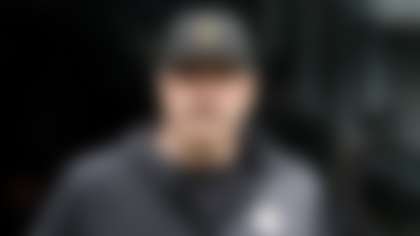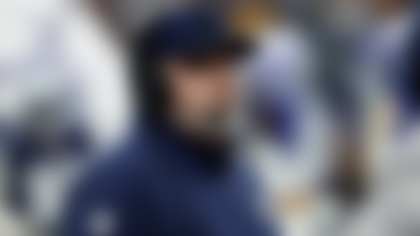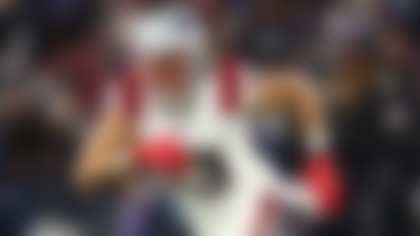PITTSBURGH -- The Pittsburgh Steelers own one of the NFL's greatest home-field advantages at Heinz Field, where winds howling off the three rivers torment opposing kickers and fans stomping on the upper-deck bleachers create a disruptive din.
The Steelers, winners of 75 percent of their regular season home games since moving into Heinz in 2001, only wish they didn't have so many home fields.
After four high school regional championship games and the South Florida-Pitt game were played on Heinz Field's fast-deteriorating grass in 17 hours last weekend, 2 1/2 acres of brand new sod were laid atop the old turf. The final strip went down Sunday night, less than 24 hours before Monday night's Dolphins-Steelers kickoff.
That is, the scheduled starting time. Heavy rain and lightning caused a 25-minute delay in the scheduled 8:30 p.m. EST kickoff, with both teams sent to their locker rooms as stadium workers hurried to repaint the yard lines and goal lines that had washed away. Fans were also ordered out of their uncovered lower bowl seats.
The teams were given nine minutes to hurriedly finish up their previously delayed warmups before the rain and the game started at nearly the same time. Only a few yard lines were visible on the field, and the national anthem and other pregame activities were canceled.
The weather was more reminiscent of Miami than Pittsburgh, with the rain so heavy at times that it resembled that which fell during the Steelers' 13-3 win at Miami on Sept. 26, 2004. That game, which featured Ben Roethlisberger's debut as the Steelers quarterback, was pushed back to a nighttime start after Hurricane Jeanne struck south Florida earlier that day.
With at least three more home games remaining, the Steelers were convinced the old turf - where brown patches kept growing bigger between the hash marks - had to go as late fall gave way to winter.
"It's about providing a good field for both teams," Heinz Field manager Jimmie Sacco said.
The Steelers have had repeated problems maintaining a quality grass field since they left Three Rivers Stadium and its asphalt-hard artificial turf in 2000.
In 2002, the grass field was replaced three times from spring until the end of the season; another year, the grass in the middle of the field was torn out and replaced.
The Steelers felt they had solved their problems in 2003 by installing DD GrassMaster, a surface in which the grass is anchored with synthetic fibers. However, that grass has regularly worn down, leaving barren patches that were painted to give a grass-like appearance.
"When you get a lot of play on it, it's going to wear," said Pitt coach Dave Wannstedt, whose team shares Heinz Field with the Steelers. "There's nothing you can do about it."
Across the state, the Philadelphia Eagles are experiencing the same problem at Lincoln Financial Field, which they share with Temple. New sod will be laid there before the Eagles' Sunday home game against Seattle.
"Everyone knows what they're getting into when they come here," kicker Phil Dawson said. "It's a tough place to play with great tradition. They've got great fans here. And I wouldn't be surprised if the field was part of it."
The latest field fiasco apparently has the Steelers rethinking their grass-only policy. They already practice regularly on Field Turf in their indoor practice building.
Some in Pittsburgh wonder if a different type of grass surface or altered maintenance might help the Steelers keep grass and avoid a switch to artificial turf.
When Pitt's players arrived at Heinz Field for their spring game in April 2006, they were surprised to find the field markings and paint remained from the Steelers' final home game Jan. 1 - suggesting little had been done to the turf since then. Two blocks down the street at the Pirates' PNC Park, there was a lush grass surface.
Former Steelers coach Bill Cowher always wanted to keep grass. New coach Mike Tomlin also sees nothing wrong with Heinz Field's grass, possibly because he hasn't lost a game on it.
"It is part of playing football in December and January, when you play where we play," he said. "As long as we deal with it better than our opponent, I love our field."
Copyright 2007 by The Associated Press



